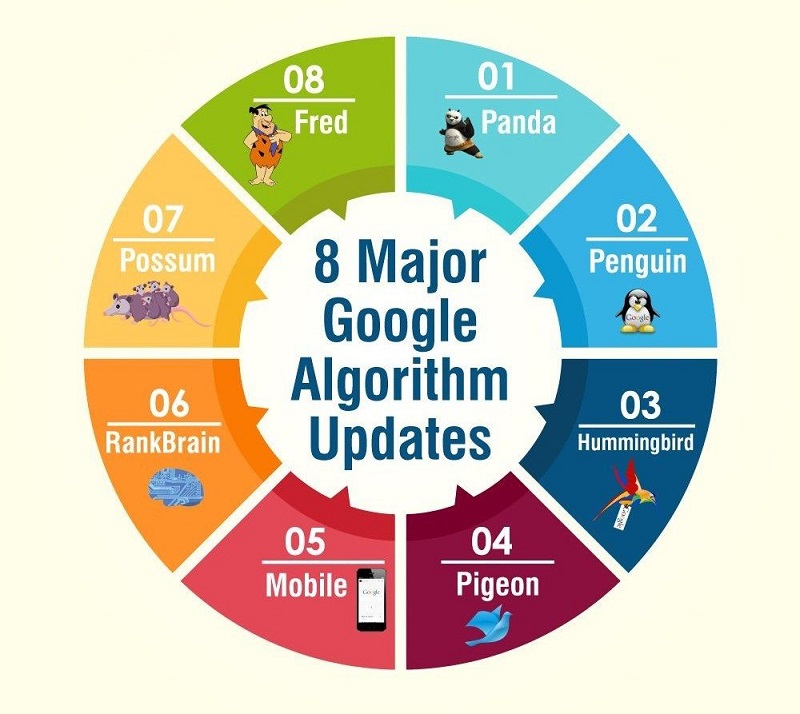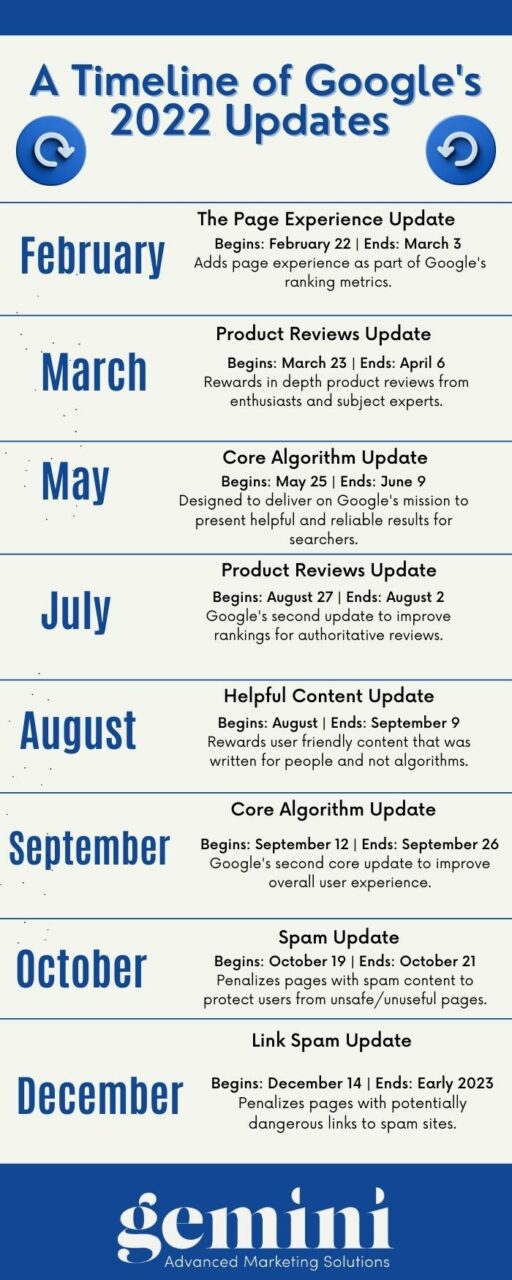Unwinding the Secret of Google's Algorithm Updates for Search Engine Optimization Victory
Unwinding the Secret of Google's Algorithm Updates for Search Engine Optimization Victory
Blog Article
Understanding the Ramifications of Google's Formula Updates on Search Engine Optimization Positions and approaches
In the ever-evolving landscape of search engine optimization (SEO), the ramifications of Google's algorithm updates have ended up being a focal point for organizations and marketers intending to preserve or boost their on the internet exposure (Google’s Algorithm Updates). As Google remains to refine its algorithms to give customers with one of the most pertinent and high-grade search results page, understanding just how these updates influence search engine optimization positions and techniques is vital. From the refined shifts in keyword approaches to the more noticable focus on user experience, the interplay between algorithm updates and SEO techniques reveals an intricate internet of factors to consider that require consistent caution and flexibility
Evolution of Google's Formula

The Panda upgrade, introduced in 2011, targeted low-grade web content and penalized websites with duplicate, thin, or pointless material. Penguin, released a year later on, resolved link spam by cheapening manipulative links. Hummingbird, introduced in 2013, marked a change in the direction of semantic search, comprehending the context and intent behind user queries rather than simply matching key phrases.
These updates required website proprietors and search engine optimization specialists to focus on user experience, high quality material, and natural web link structure strategies to boost their rankings in Google's search outcomes. The evolution of Google's formula emphasizes the online search engine's dedication to delivering appropriate and valuable web content to users while penalizing strategies intended only at gaming the system.
Influence On Key Phrase Approach
With the evolution of Google's algorithm towards prioritizing user experience and content relevance, the Influence on Key words Technique has ended up being progressively vital for internet site proprietors and search engine optimization experts seeking to line up with these online search engine updates. Keyword phrases are no more nearly matching search terms but understanding customer intent and supplying useful web content. Google's updates, such as BERT and RankBrain, concentrate on natural language processing and context, making keyword strategy more innovative.

Moreover, with Google's focus on semantic search and user-focused web content, key phrase stuffing is no more efficient and can also damage positions. Rather, integrating keywords naturally right into high-grade, relevant content is key. By comprehending the effect of Google's algorithm updates on key phrase method, internet site proprietors can boost their search engine optimization initiatives and boost their presence in search engine result.
Adjustments in Web Content Optimization
As the landscape of seo remains to progress, web site owners and SEO professionals are witnessing significant changes in web content optimization approaches. Following Google's formula updates, there has been a growing emphasis on developing high-grade, pertinent, and reliable material that provides worth to customers. This indicates that just stuffing keywords right into posts is no longer effective; rather, material must be well-written, interesting, and customized to meet the needs of the target market.
Moreover, there is a higher emphasis on customer experience and satisfaction, with search engines satisfying internet sites that offer a seamless browsing experience and useful details. As a result, content optimization now includes not just including relevant keyword phrases normally yet additionally structuring content in a way that is easy to check out and browse.
Relevance of Customer Experience
Enhancing user experience on a site is vital in modern-day search engine optimization techniques, working as a crucial element in identifying a site's exposure and success in online search engine rankings. Individual experience includes various elements such as site speed, mobile-friendliness, intuitive navigation, and engaging content (Google’s Algorithm Updates). Google's formulas significantly focus on internet sites that use a smooth and gratifying individual experience, as it directly correlates with user fulfillment and retention
A favorable individual experience not only boosts a website's search engine optimization efficiency yet likewise adds to greater conversion rates and client loyalty. Sites that are easy to browse, about his visually appealing, and provide useful material are a lot more most likely to attract and keep visitors. On the other hand, web sites with inadequate customer experience metrics may experience high bounce rates and low dwell times, signaling to search engines that the web content may not be engaging or pertinent for users.
Therefore, purchasing optimizing customer experience is necessary for maintaining an affordable edge in the ever-evolving electronic landscape. By prioritizing user-centric layout and performance, internet sites can enhance their search engine positions and ultimately drive more natural traffic and conversions.
Approaches for Future Adaptation
Progressing in the quickly evolving landscape of SEO, it is important for organizations to adopt ingenious strategies for future adaptation. One crucial strategy is to focus on developing top quality, appropriate web content that offers worth to customers. This content ought to be enhanced for keywords that align with individual intent and need to be routinely updated to remain competitive and current.
Furthermore, services need to prioritize mobile optimization to cater to the enhancing number of individuals accessing the net using smart phones. Guaranteeing that web sites lots promptly, are easy to browse, and provide a seamless user experience on mobile devices can help enhance search rankings and individual fulfillment.
Moreover, leveraging information analytics and individual habits understandings can help companies understand their target audience go to this site better and tailor their SEO strategies accordingly. By monitoring key efficiency indications and changing methods based on data-driven insights, businesses can remain in advance of the contour and adapt to the ever-changing SEO landscape. Welcoming arising innovations, such as voice search optimization and expert system, can also be beneficial for future-proofing search engine optimization approaches.
Final Thought

With the evolution of Google's algorithm towards focusing on customer experience and web content significance, the Effect on Keyword phrase Technique has become increasingly crucial for internet site proprietors and Search engine optimization specialists looking for to straighten with these search engine updates. Google’s Algorithm Updates. Keywords are no longer just concerning matching search terms however recognizing individual intent and supplying useful web visit this page content. Google's algorithms increasingly prioritize sites that offer a satisfying and seamless individual experience, as it straight correlates with customer complete satisfaction and retention
In contrast, websites with bad customer experience metrics may endure from high bounce prices and low dwell times, indicating to look engines that the content may not be pertinent or appealing for users.
The advancement of the algorithm has actually shifted emphasis towards individual experience and quality material, impacting keyword method and content optimization.
Report this page